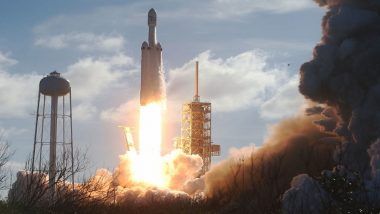Washington, May 17: SpaceX postponed a launch of 60 satellites into low-Earth orbit that was scheduled for last night, possibly until next week, citing a need for software updates. The SpaceX Falcon 9 rocket launch from Cape Canaveral was to be the first of potentially thousands in its Starlink project to beam broadband internet across the planet. SpaceX Lands Falcon 9 Rocket on Land After Delivering Satellite.
"Standing down to update satellite software and triple-check everything again," said a tweet from the official SpaceX account. "Always want to do everything we can on the ground to maximize mission success, next launch opportunity in about a week." The launch, which was initially envisaged for Wednesday, was first delayed because of high winds.
Billionaire Elon Musk's firm, which is leading the private space race when it comes to rocket launches, is now looking to seize a chunk of the future space internet market. The launch will make it an early forerunner, along with rival OneWeb, a startup, but well ahead of Amazon's Project Kuiper, the brainchild of Musk's space rival Jeff Bezos.
Musk is hoping to grab three to five per cent of the future global market, a figure he shared Wednesday during a call with reporters.
That could earn SpaceX an eye-watering USD 30 billion a year, more than ten times what rocket launches make, he added.
The goal is to finance the development of future rockets and spacecraft, to realize the boss's dream of colonizing Mars. Each of the satellites weighs just 227 kilograms (500 pounds) and was built in-house in Redmond, near Seattle.
The second stage of the rocket will begin to release them one hour after launch, at an altitude of 270 miles (440 kilometers), and then the satellites will use their thrusters to take up their places in a relatively low orbit of 340 miles (550 kilometers).
That's slightly higher than the International Space Station, but well below the majority of terrestrial satellites, the highest of which sit in a geostationary orbit of 22,400 miles (36,000 kilometers). The advantage of being so low is reduced lag times, key for broadband connectivity. The disadvantage though is more satellites are required to cover the globe, and, being closer to the atmosphere, they fall back to earth faster, after a few years.
SpaceX will therefore have to replace them regularly - something that only became realistic from a price perspective recently with the rapid decline in the cost of manufacturing satellites and the development of mini-satellites. Elon Musk Gives a Peek into SpaceX's Starlink Internet Satellites.
SpaceX has obtained approval from the US government to launch up to 12,000 satellites, at varying levels of orbit, but Musk said Wednesday that a thousand would be enough for it to be "economically viable." Starlink will become operational once 800 satellites have been activated, which will require a dozen more launches.
"I think within a year and a half, maybe two years, if things go well, SpaceX will probably have more satellites in orbit than all other satellites combined," said Musk. Today there are about 2,100 active satellites orbiting our planet (and thousands of others that aren't operational any more).
In order to receive SpaceX internet, users will need an antenna which "basically looks like a sort of a small to medium sized pizza," said Musk, adding it would be a "flat disc." The company plans to team up with telecoms operators, but hasn't yet begun the process of finding clients, he said.
The satellites will be designed such that 95 per cent will burn up as they fall back through the atmosphere, with the rest of the debris falling into the Pacific ocean. Finally, to reduce the risk of striking other satellites, each piece of the constellation will be equipped with anti-collision technology, according to SpaceX. Musk added: "We don't want to trivialize it or not take it seriously because we certainly do take it seriously. But it's not crowded up there, it's extremely sparse."
(The above story is verified and authored by Press Trust of India (PTI) staff. PTI, India’s premier news agency, employs more than 400 journalists and 500 stringers to cover almost every district and small town in India.. The views appearing in the above post do not reflect the opinions of LatestLY)













 Quickly
Quickly


